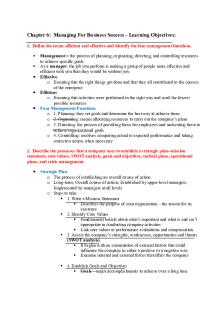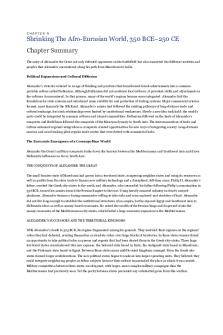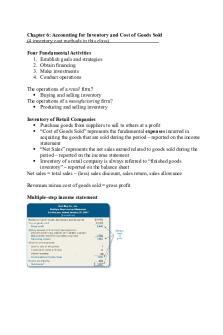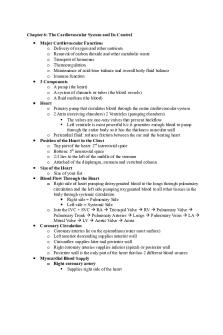COM Chapter 6 - Lecture notes 6 PDF

| Title | COM Chapter 6 - Lecture notes 6 |
|---|---|
| Author | yankees42 NA |
| Course | Introduction To The Study Of Mass Media |
| Institution | Illinois State University |
| Pages | 4 |
| File Size | 85.1 KB |
| File Type | |
| Total Downloads | 24 |
| Total Views | 183 |
Summary
Dr. C
Com 101...
Description
Name: Andrew Frey
!
PREPARING TO PARTICIPATE Chapter 6: Analyzing your Audience 6.1 Knowledge Discuss why it is important to consider your audience when developing and producing your speech.
!
One of the biggest reasons why it is important to consider your audience when developing your speech is because they are the people that you were talking to. If the people listening to your speech don't feel connected or immersed in anyway, you will lose interest and everything you have to say is unimportant.!
! ! ! !
Application What would be the consequences of not considering your audience? Can you think of an example when someone said something without considering whom he or she said it to? What happened?
! !
A consequence of not considering your audience might be giving a speech to the wrong demographic of people. For example you could be giving a speech that relates to Catholics when everyone in the room is Muslim.!
!
One of the first things that popped into my head is peoples views on homosexuals. A lot of times people won't consider their audience and who they're talking to and just blurt out their views to others when they may not feel the same way they do. This can cause tension, and not be good for either side. !
! ! !
6.2 Knowledge Define audience demographics. Give examples of demographic traits.
!
Audience demographics can include a number of characteristic traits that the audience possesses. These can include the audiences age, sex, gender,msexual orientation, occupation, education, religion etc.!
! ! ! !
! !
Application Consider your classroom audience. Which audience demographic traits will be important to consider with your topic? Consider the various classes you are taking. How are the audiences in those classes different from this one?
! ! !
When I'm in the classroom teaching a very important audience demographic trait to take into account would be my students age, gender, cultural background, and religion. It's important to make sure that all my students in my class feel safe and equally excepted so I do not accidentally offend anyone. !
!
When comparing the differences in audience demographics from my political class to speech class would be the students political affiliation, group membership, and religion. They are different because in each class we take we are exposed to different topics therefore while a majority of my classes may repeat certain themes with audience demographics, not one class will ever be the same.!
! ! ! !
Name: ____________________________________________________________
!
PREPARING TO PARTICIPATE Chapter 6: Analyzing your Audience, cont. 6.3 Knowledge List six factors to consider when analyzing the speaking situation. Then, note information to consider for each factor.
! !
1. Size- it's important to know this because you should know the size of the crowd that you are addressing. For example you would address a large auditorium speech differently from a small classroom discussion! 2. Setting- it is important to know the setting that you were speaking in as to account for different obstacles you may face during your speech! 3. Type- by knowing the type of audience that you are giving your presentation to you can account for their level or enthusiasm. ! 4. Interests- it might be important to account for your audience interest as well. You should know their hobbies activities job interests before you give a speech see you could connect with them more easily! 5. Knowledge- knowing your audience is knowledge on the topic you're giving is important because it tells you how much you need to going to detail on what you're talking about! 6. Attitudes- this ascribe to see your audiences feelings towards a topic you're given. These are their beliefs and values that they have grown up with. !
! ! ! ! !
Application Consider your classroom audience. Assess your speaking situation using the six factors to consider when analyzing your audience. How does speaking in a public forum differ from speaking in a classroom?
!
Speaking in public and differs from speaking in the classroom in the sense that speaking in public is more formal and persuasive based while speaking in the classroom is more informative. For each different speech you must look at different components one analyzing your audience. For example when analyzing your audience the type of audience you are speaking to in a classroom may not be as of important knowledge as if you are speaking in front of a large group of people.!
! ! ! ! !
6.4 Knowledge List and describe the informal and formal methods of gathering information about the audience.
! !
Informal methods of gathering information can include spending time with your classmates both before and after class to gauge their interests. As well as in the classroom with introductory speeches and group projects. Formal methods can include interviewing, focus groups and studying.!
! ! ! ! ! Application !
Considering your speech topic, what questions (both formal and informal) can you ask your audience? How will you use this information as your research your topic and write your speech? What will you say to connect your speech to your audience?
! !
It important to know because I have to keep in mind the knowledge level of my audience. Because almost all of my audience are freshman students at illinois state university all majoring in some type of education I have to realize that not everyone will know the technical names like if I was giving a presentation to a group of school board members. This helps me connect to my audience by being able to hold and gain their interest based on their understanding.
!...
Similar Free PDFs

COM Chapter 6 - Lecture notes 6
- 4 Pages

Chapter 6 - Lecture notes 6
- 5 Pages

Chapter 6 - Lecture notes 6
- 6 Pages

Chapter 6 - Lecture notes 6
- 9 Pages

Chapter 6 - Lecture notes 6
- 11 Pages

Chapter 6 - Lecture notes 6
- 4 Pages

Chapter 6 - Lecture notes 6
- 3 Pages

Chapter 6 - Lecture notes 6
- 24 Pages

Chapter 6 lecture notes
- 1 Pages

Chapter 6 - Lecture Notes
- 16 Pages

Chapter 6 slides - Lecture notes 6
- 49 Pages

MGMT - Chapter 6 - Lecture notes 6
- 14 Pages
Popular Institutions
- Tinajero National High School - Annex
- Politeknik Caltex Riau
- Yokohama City University
- SGT University
- University of Al-Qadisiyah
- Divine Word College of Vigan
- Techniek College Rotterdam
- Universidade de Santiago
- Universiti Teknologi MARA Cawangan Johor Kampus Pasir Gudang
- Poltekkes Kemenkes Yogyakarta
- Baguio City National High School
- Colegio san marcos
- preparatoria uno
- Centro de Bachillerato Tecnológico Industrial y de Servicios No. 107
- Dalian Maritime University
- Quang Trung Secondary School
- Colegio Tecnológico en Informática
- Corporación Regional de Educación Superior
- Grupo CEDVA
- Dar Al Uloom University
- Centro de Estudios Preuniversitarios de la Universidad Nacional de Ingeniería
- 上智大学
- Aakash International School, Nuna Majara
- San Felipe Neri Catholic School
- Kang Chiao International School - New Taipei City
- Misamis Occidental National High School
- Institución Educativa Escuela Normal Juan Ladrilleros
- Kolehiyo ng Pantukan
- Batanes State College
- Instituto Continental
- Sekolah Menengah Kejuruan Kesehatan Kaltara (Tarakan)
- Colegio de La Inmaculada Concepcion - Cebu



